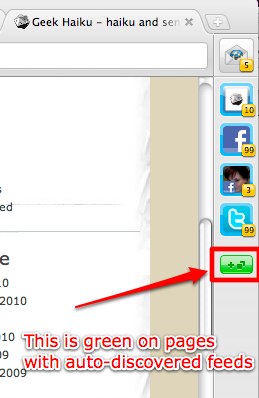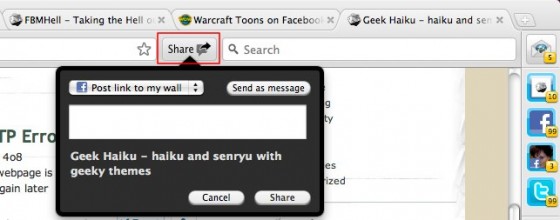So I tried out RockMelt earlier this week, not because I feel that we need another web browser out in the wild, but because this is what I do for a living, it’s important for me to know what’s going on, and more specifically, if it’s going to break my shit.
Note: This will be a quick one long and rambling, because my Macbook Pro is in the shop and I’m using an old 13″ Macbook to write this, and it makes me want to punch babies that’s how I roll.
RockMelt is a new browser that puts more emphasis on your own social network of friends, backed by the some of the guys behind the Netscape browser. If you’ve been living under a rock and haven’t heard of it, watch their promo video below:
That video is pretty much all their website has to offer curious onlookers right now, and it sure makes you feel good watching it. Until you realize that the warm fuzzies Toby is talking about have more to do with his involvement in social networks and being connected to his friends in general than they do with those connections being integrated into your browsing experience.
Personally, I think the toolbars of your Facebook friends and applications looks nice, but after using it for five minutes, I wanted to hide them. I like my screen real-estate, and it’s creepy to have a dozen of my friends and family staring at me from the sidebar while I’m spanking it to my favorite Brazilian transvestite pr0n.
If I hide that toolbar, I’m hiding the very feature that sets RockMelt apart from other browsers, so while it’s great that you can hide it, what you’re left with at that point is a very vanilla browser that is exactly the same as every other browser.
One thing that actually really pissed me me off is that when I connected RockMelt to my Facebook account (which it prompts you to do immediately upon first-time launch), it set my online status to “online” automatically. I never show myself as online, because if you don’t have my real chat client names (Gtalk, AIM, etc), I probably don’t want to talk to you anyway. It took me a minute or two to figure out how to turn it back to “offline”. I don’t know if that’s RockMelt’s fault or Facebook’s, but given how creepy-uncle Facebook has been over the last year, that did not make a stellar first impression.
Speaking of Facebook – am I the only one that’s creeped out by the fact that Facebook is one of the backbones of this browser? For all they have done to betray my trust over the past year, the LAST thing I want to do is facilitate them knowing what I’m doing online more than they already do.
Do I think RockMelt has formed an unholy union with Facebook to spy on me? No – but RockMelt doesn’t tell you much of anything right now (and Facebook never does), so my lack of understanding about what data is being collected and stored by Facebook by way of RockMelt makes me very uncomfortable.
Also, it’s pretty clear by the way Facebook integration stands apart from the other social networks like Twitter that RockMelt is focusing primarily on Facebook. Considering how often Facebook’s API changes (read: breaks) and how much they are moving forward with their own agendas, I’m not sure this is a good long-term plan. One article on TechReview comments: “It’s not a generic ‘social browser.’ It’s a Facebook browser.”
Considering how Facebook is already trying to re-invent the web, I don’t know what that means for RockMelt in the future.
There are some nice features to RockMelt though. The right-side sidebar gives easy access to twitter with a simple but elegant UI, however it doesn’t really seem to be optimized for people with a large number of followers/following.
 Also in that right sidebar, you can add RSS feeds to keep track of your favorite websites. They’re displayed beautifully, with a square site icon (based on the site’s favicon) and an unread count badge. If you’re on a site that has a detectable RSS feed, the “add feed” button turns green.
Also in that right sidebar, you can add RSS feeds to keep track of your favorite websites. They’re displayed beautifully, with a square site icon (based on the site’s favicon) and an unread count badge. If you’re on a site that has a detectable RSS feed, the “add feed” button turns green.
I think this could actually work to help people who don’t know or care what RSS feeds are learn to use them more. The one-click nature of subscribing when you’re on a page with an RSS feed makes the whole process cleaner and more clear than traditional RSS subscriptions, where the process is slightly more technical and deliberate.
On other browsers, even if a non-technical user can decipher what “Subscribe to RSS” means, they still have to do some work to access those feeds. RockMelt makes it a no-brainer – the user doesn’t need to know what RSS is for them to immediately see the benefit of subscribing – however it also simplifies it to the point where it could potentially be useless for people who already know and love RSS, and are subscribed to many feeds.
I subscribe to over 100 RSS feeds, so RockMelt is clearly not going to be of much help there. Maybe one solution would be to sync with Google Reader (please?) and let you pick your top five that you want to have in your sidebar.
That right-side toolbar references “Apps and Feeds”. I wonder if some sort of Facebook application integration is on their roadmap, which would be great, because then the useless jackholes that spend all day playing Farmville at the office won’t even need to switch browser windows to annoy the living shit out of everyone they know.
Another nice feature is the “Share” button built into the browser, that puts Twitter and Facebook sharing just a click away.

Of course there are already bookmarklets for all that already, and most websites now have share functionality built into their content, but for the less tech-savvy who might not know they exist, this makes it easy for people to share what they’re looking at in a way that uses a consistent UI on every single page they visit.
One UI irritation I ran across is that if you have the share pop-up activated and switch apps, it can be easy to forget that it has focus, so when you switch back to RockMelt, and go to type something in the url bar, the comments box in the share popup still has focus, which could lead to some embarrassing moments when you meant to pull up your favorite pr0n site but ended up accidentally sharing it with your Facebook wall. (I only accidentally shared the RockMelt website. This time.)
Ultimately, other than perhaps a morbid sense of curiosity, whenever a new browser comes out, I’m more worried than excited. If it becomes remotely popular, that’s one more browser I have to test on, one more variable thrown into the standards mix.
It’s not as bad these days as it used to be. Most current browsers have some semblance of standards-compliance, and display differences are minimal. (If you don’t believe me, you haven’t been in the industry as long as I have. Trust me on this one. It used to be so, so much worse.)
I’m pleased to say that RockMelt’s rendering seems fine, and while I haven’t had a chance to do any complicated DOM-tomfoolery with it yet, all of my initial tests showed layout and javascript working exactly as expected, and exactly as it would appear in any other browser. So that’s good news.
It may seem like I’m hating on RockMelt – I’m actually not.
Is it a browser for the power user? I’d say not.
Is there a market for it? I think so.
Most of the tech site reviews have been neutral at best, or condemning this browser to failure before it’s even open to the public, but I think that’s a symptom of who has been given access to review it. Naturally, the techies are going to be the ones with the first-look. In fact, they’re normally the only ones that care about a first-look. And techies are exactly the audience this browser will not fly for. At least not at this point.
But it’s important to remember that there people out there that aren’t as tech savvy – who wouldn’t know a Firefox addon if it bit them in the ass, and have no desire to know more. I look at my biological father, who only recently got an email account and joined Facebook. He doesn’t know or care about computers, and the only reason he finally broke down and got an email account was to stay in touch with my sister and I. As he uses the internet more, I expect him to find more things he likes (pr0n), but he just doesn’t care about how or why it works, and won’t go to great lengths to figure stuff out.
To techies, Facebook may be an aggravation – something we put up with because it’s part of our jobs or because it’s so ubiquitous that it’s hard to leave. But people spend more time on Facebook than on any other site on the web, so clearly, there are plenty of folks (and by plenty, I mean *millions*) that love it and use it constantly.
RockMelt’s tagline is “Your browser. Re-imagined.” So far, it’s more like “Your browser. With some integration that’s already totally possible with plugins, for people not savvy enough to use plugins.” But it’s early yet, and I’m curious to see where it goes.
Also? Dumbest name ever. Seriously guys. WTF.